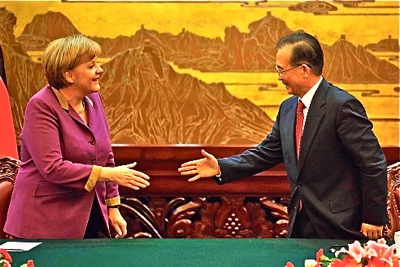
The German Chancellor has just completed her fifth trip to China since she took office. During her three-day visit, Angela Merkel was able to meet with President Hu Jintao and Wu Bangguo, current Chairman and Party secretary of the Standing Committee of the National People’s Congress. In addition, she held meetings with Prime Minister Wen Jiabao.
She visited Guangzhou, capital of the southern province of Guangdong, where she attended, together with the Chinese Prime Minister, a trade seminar bringing together businessmen from the two countries. She also visited the Chinese branch of Herrenknecht AG, specialized in tunnel-drilling machines.
Since the Germans have not lost their triple A, did not participate in the war against Libya and have kept a very low profile during the recent campaign in favour of a resolution against Syria, which China opposed on two occasions at the Security Council, they are today in a favourable position to negotiate with the Asian giant.
Germany and China have registered over the past years an amazing surge in their trade relations. While the flows were limited to 6.3 billion euros in 1990 and 28 billion euros in 2000, they have exceeded 132 billion euros in 2011.
Germany is today Beijing’s major partner in the euro zone and China could become this year the second export market in the world for German companies.
But above all, China has become Germany’s first partner ahead of France.
However, the Franco-German economic partnership is the cornerstone of the European Union as it was conceived since the ECSC treaty.
While France has turned towards the Atlantic powers of the United-Kingdom and the United States, Germany opted for a Eurasian continental strategy.
While Alain Juppé conscientiously abides by Hillary Clinton’s and Bernard-Henry Lévy’s instructions in terms of foreign policy, Ms Merkel seems to be harboring other ambitions for her fellow-countrymen. Without hesitation, she pledged to actively support Nicolas Sarkozy’s re-election bid: with France serving Atlanticist interests, the path is clear for Germany to strengthen her positions in Eurasia.
Above all, the Germans are wise to the conclusions to be drawn from the double veto at the Security Council: the global balance of power has just shifted, a new multipolar equilibrium based on the BRICS and the Shanghai Cooperation Organization is gradually taking shape.























Stay In Touch
Follow us on social networks
Subscribe to weekly newsletter